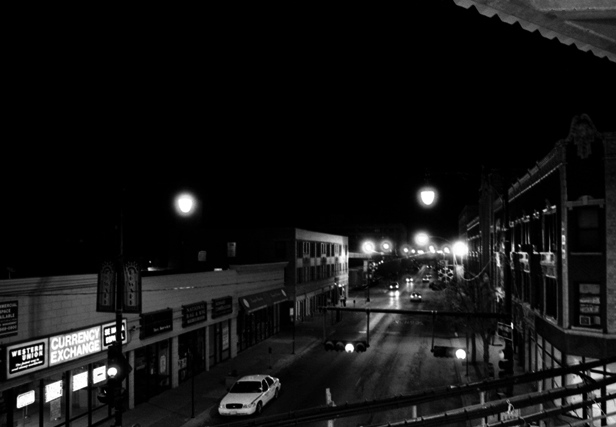Dark and tantalizing CCM program spotlights Lee Hyla and friends
The reliably arresting Composer Perspectives series by the Chicago Chamber Musicians offers the rare chance to hear leading contemporary composers do their best imitations of concert presenters. CCM didn’t have to go far to seek out Northwestern University’s Lee Hyla, who personally introduced three of his own distinctive works Monday night—all of them making area premieres.
As Hyla said beforehand, this program—which also featured the music of David Rakowski and George Crumb–was going to be a night of “challenging music.” Yet with a panorama of three unique compositional voices, this made for a more tantalizing evening than a difficult one. At Roosevelt University’s Ganz Hall, familiar figureheads of Chicago’s new music scene—George Flynn, Stacy Garrop, Shulamit Ran—helped populate a bustling crowd of loyal followers, young and old.
At the center of it all was Hyla, who gets a lot out of less. This was most evident in his Pre-Pulse Suspended (1984), scored for a large chamber ensemble of 12 players. With plenty of snarly brass and heated dynamics, the music throbs with energy, led by violist Rami Solomonow and bass clarinetist Wagner Campos. Hyla composed this during the year of his father’s death, and a taut string elegy appears at the heart of the music. Once the frenzied energy returns, the chapters of a deeply personal narrative have unfolded. Michael Mulcahy conducted in fine fashion, holding serve with a complicated score.
Warble (2008) for flute and piano, is a plucky 8-minute exercise of friendly interplay rife with steely harmonies. Oddly, flutist Mary Stolper’s strange and lovely tone is also excessively echoic, and even hollow at times. The result is hypnotic but bizarre. The music never quite stabilizes, giving the effect of a butterfly that’s struck with a pebble in mid-air.
Hyla’s hooty Wilson’s Ivory-bill (2000) layers pre-recorded tape of a woodpecker over live singing. In this case, the unflappable baritone Scott MacLeod did his best sprechstimme, alternating stoically between speech and song. Sterling performance that it was, this droll piece of theater, based on the journals of early 19th century ornithologist Alexander Wilson, might have benefitted from a schmaltzier and more carefree approach.
West Virginia’s own George Crumb and his 11-part sound experiment Eleven Echoes of Autumn (1986) practically recreates the whispering wind voices of the Blue Ridge mountains. Pianist Kuang-Hao Huang manipulated the strings from inside the piano, yielding a slowly reverberant meditation that conjures image of vast country. Close your eyes and you can almost mistake Mathias Tacke’s simultaneous whistling and fiddling for a creaky see-saw. Whatever Crumb’s expressive limitations, his vision for producing exotic sounds is unrivaled.
Hyperblue (1993) by David Rakowski, might be the soundtrack to an Ingmar Bergman film had he ever directed an American film noir. Said to explore the “dark side of jazz,” the work is closer to a neo-romance, with its gut-wrenching episode between violinist Joseph Genualdi and cellist Jacob Braun.
Posted in Performances





